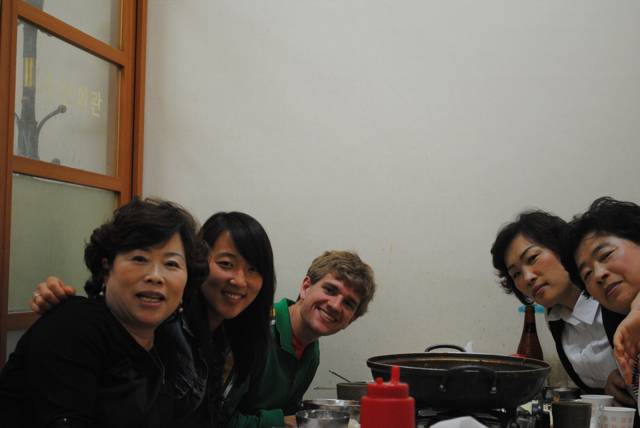 In the final part of a four-part series, Mica wraps up her trip with her Omma. To catch up on where we’ve been together so far, click here!
In the final part of a four-part series, Mica wraps up her trip with her Omma. To catch up on where we’ve been together so far, click here!
The next morning, after picking culturally-appropriate breakfasts from the buffet (eggs, toast, and juice for me and the boyfriend and kimchi, rice, and beanpaste soup for my relatives), we headed out for a day of shopping. Omma and my aunts insisted on finding us “couples shirts,” which are just what they sound like — matching shirts for couples. As if she hadn’t already given me enough, Omma was really eager to buy me lots of things, and I eventually had to explain that I really was not in need of anything. We ended up with two sets of couples shirts and a hat. (Since I wrote this, Omma has also insisted that I send her my measurements so that she can have a traditional Korean hanbok made for me.)
We headed to Myeongdong, a local shopping district geared towards the Seoulite youth, for some ice cream and group photos. Omma also bought us some kkultarae, which are fine threads of spun honey wrapped around nuts and fruit. The little honey strings are hard to eat, which made for some hilarious photos of my aunts.
For lunch, First aunt told us that we were going to eat sashimi since the boyfriend had said that he loved sushi and raw fish. We piled into the car, and Omma headed to the gigantic Noryangin fish market. I know nothing about picking out fish (especially when they are still swimming in tanks), but Omma and aunts were quite the discerning shoppers. The boyfriend and I looked on in amusement while avoiding the sloshing sea water.
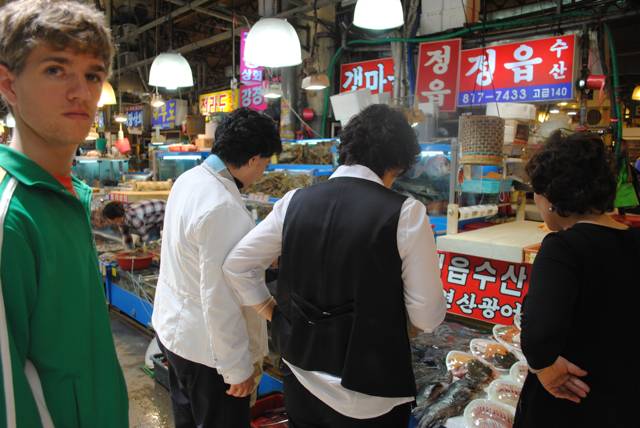
How does one pick fish at Noryangin? First, the stall owner uses a giant hook and a net to fling a particular fish onto the ground for inspection. After being deemed worthy of purchase/consumption, these fish are loaded into a basket and swiftly decapitated and beaten with a mallet by the fish executioner. With a bag of freshly filet-ed flounder and some variety of scary-looking fish in hand, Omma directed us to one of the restaurants down below the market. The server takes your bag of freshly decapitated fish and your cooking instructions and then brings you your food. In this case, the instructions were for a gigantic plate of raw fish, like Japanese sashimi.
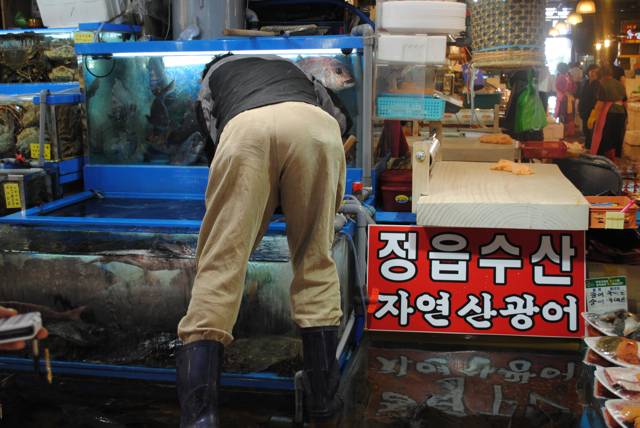
My relatives showed us how to make little rolls of out of rice, perilla and lettuce leaves, fish slices, various vegetables, and sauces. Omma also saved the best part of a snail for me-the mouth. She kept motioning that it would make me strong.
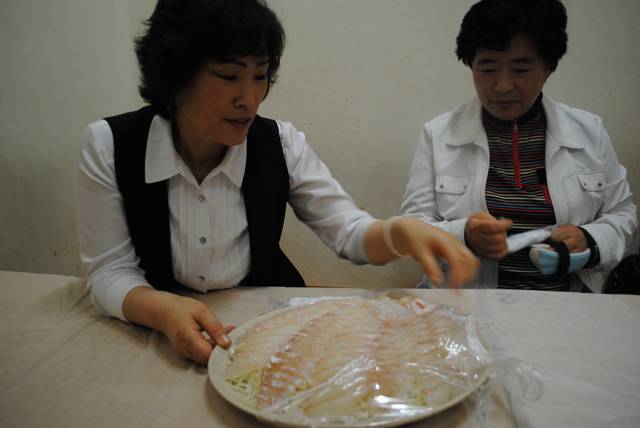
Just when I thought I was going to explode from the sheer volume of fish, vegetables, and side dishes in my stomach, the server came in with a gas burner and a huge bowl of myeongtang, or fish stew. I had mentioned the day before that I liked sujebi (a kind of Korean dumpling soup) so, of course, Omma and aunts ordered the server to make the soup into sujebi. The server came in with a giant ball of dough, which she tore into thin little strips and dropped in the boiling cauldron of soup.
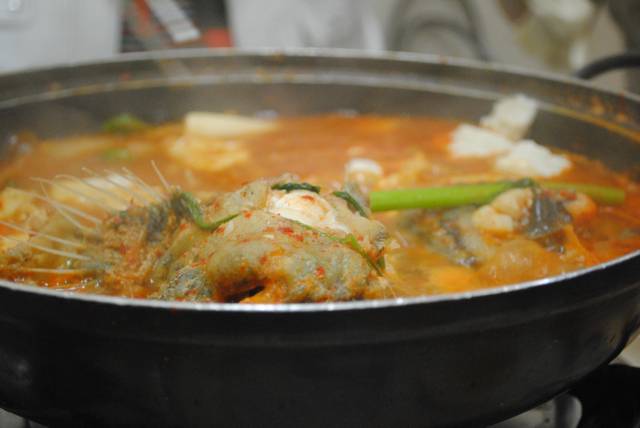
Let me tell you, I have never seen anyone eat like Korean women. They really know how to put it away. I think that I eat a lot, but apparently, Omma was worried that we hadn’t eaten enough dinner or lunch. She kept refilling our bowls and plates and offering us morsels of fish that she had pulled from the bones. The aftermath of a meal for five looked like Hannibal’s army had just swept through the restaurant.
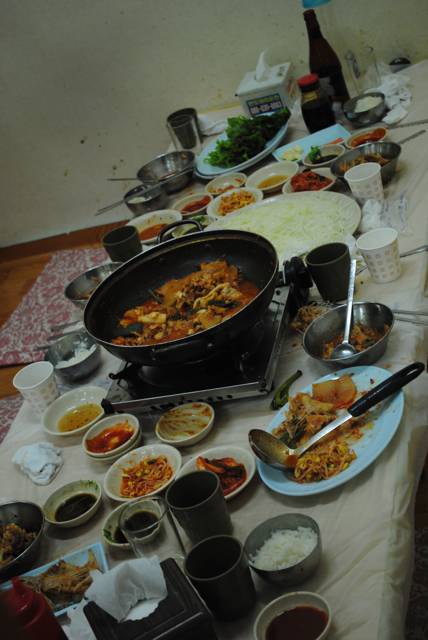
After lunch, it was suddenly time for Omma and my aunts to start their long drive back home. (They live in cities in the southern part of Korea.) They braved more crazy Seoul traffic and took the boyfriend and me back to our guesthouse. Worried that we hadn’t eaten enough (SO FULL!), they also gave us a giant bag of leftovers from the evening before.
Saying “good-bye” was much harder than saying “hello” had been, just 24 hours before. Omma held my hand and spoke to Mrs. Lee on the cell phone, asking her to translate our goodbyes. Over the phone, Mrs. Lee told me that Omma was very happy to meet me and was very sorry that she wouldn’t be able to see us off at the airport when we left Korea the following day. I told Mrs. Lee to thank Omma for everything and tell her that I was sorry that I didn’t know more Korean to communicate with her. I promised to come back as soon as possible and work very hard on my Korean language skills. When they said goodbye, Omma and my two aunts hugged me and said, “I love you” in English, which came out more like “I lub you” since Korean doesn’t have a “v” sound. As I’m sure you can imagine, I started crying at this point, but it was okay because everyone else was too (minus the boyfriend, who gave everyone tissues).
Then Omma and aunts piled into her Kia and drove away, waving the whole time. (About an hour and a half later, she sent me a text message that said “Mica! I love!”)
Afterwards, she wrote me a few e-mails to confirm that I got home safely and tell me how much she misses me already. (So many thanks to my bilingual friends who have offered their translation skills for free.) This is an excerpt from the e-mail she sent me on the day we left Seoul:
“It’s been a difficult trip, right? Right about now, you’re probably on the plane. After seeing you, I miss you even more and I regret not being able to hug you to my heart’s content. I resent myself for that. I wonder when we are going to see each other again. I can’t seem to be able to do anything because I think of you all day. I wonder if you are eating well… how you are managing to get all that luggage back home. When I think of you going to the airport without anyone there to see you off, it breaks my heart. I wonder if I should have gone to see your pretty self at the airport… Stay healthy… I’ll email you often mica~~ bye~~!!”
I’m not really sure how to conclude this very long post except by saying that I feel incredibly lucky to have found my birth mom and part of my family. If this story is new to you, I cannot begin to explain how unconventional it is. Many adoptees with whom I have communicated are not so successful in their searches: they can’t find their parents at all, their parents may refuse contact with them, their parents are too ashamed and guilt-ridden to open up at all, etc. Each time I review this story, I recognize the unique circumstances and personal courage that made this reunion possible.
Some people have asked me if I feel a sense of closure having now met my birth mom. Since I didn’t embark on this search seeking answers to major, gnawing questions (e.g., “Who am I?”), I don’t really think there are any doors that needed closing. Instead, I am excited to have a wonderful connection to Korea and to integrate the culture, language, and people into my adult life. From here, the first step I can take is to learn some Korean, and the goal of being able to speak with and write to Omma is one of the greatest motivators I could possibly imagine. I see this experience as completely positive, and I am very excited to see where it takes me.
Thank you for following along with me as I initiated and pursued my search. And please feel free to comment or contact me with more specific questions. Reading about other adoptees’ experiences in looking for their birth parents was incredibly helpful, so I wanted to document this as fully as possible, both for myself and for anyone else who may be considering a search.
Smile Politely would like to thank Mica for sharing this immensely personal and courageous story with our readers. While we emphasize a hyper-local perspective on a weekly basis, it’s writers like Mica that make our magazine into what we believe to be far and away the most dynamic and relevant print space in the greater C-U area. Cheers Mica!








